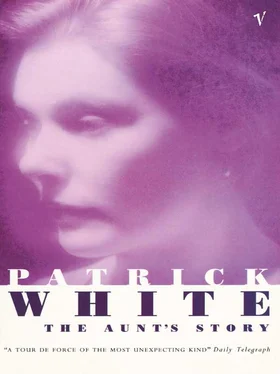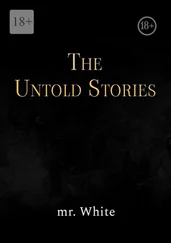Because she had been thinking of other things, of some importance and intensity, her voice was condescending and remote. She could not believe in the presence of anything so remote as Theodora Goodman. But she was not unkind.
‘I might say the same,’ said Theodora. ‘I watched you for a long time.’
‘I went there to be by myself,’ Violet said. ‘I felt sad. But it was lovely. I was reading poetry upstairs. I was reading Tennyson,’ she said.
And suddenly the voice and the presence of Violet Adams, if not her rather insipid words, but her white blouse in the apple trees, with the fragments of music that fell from Miss Belle’s hands, swept over Theodora, and she wanted to take, and touch, and join together all these sensations and make them palpable and whole.
But instead she put her arm round Violet’s waist and said, ‘Shall we walk a little more?’
‘Why not?’ Violet sighed.
Theodora could feel Violet’s sigh break against her shoulder, out of the warm blouse, which was adrift again among the apple trees. Only now there was a second white note which the dark mouth of the music just failed to swallow down.
‘Do you write poetry?’ asked Violet Adams.
‘I never have,’ said Theodora.
‘I do. I write love poetry,’ Violet said.
‘Have you ever been in love?’
‘No, but it isn’t necessary,’ said Violet. ‘Not if you have the feeling.’
Violet’s face was white. She smelt of scented soap. Her eyes were like grey moths that had escaped out of the apple trees. Theodora could feel her own humility, round Violet’s thin waist her apologizing arm.
‘I would like to write a poem,’ said Theodora. But her mouth closed. She could not describe its immensity.
‘Yes?’ asked Violet quickly, because she wanted to talk about herself.
‘I would write a poem about rocks,’ said Theodora. Her voice beat her cruelly.
‘About rocks !’ said Violet. ‘Why ever rocks?’
‘And fire. A river of fire. And a burning house. Or a bush fire,’ Theodora said.
Violet Adams extracted herself cautiously from Theodora’s arm. ‘It would be a queer sort of poem,’ Violet said.
‘But I shall not write it,’ said Theodora. ‘I doubt whether I shall ever write a poem.’
Violet Adams picked bark. She felt that she wanted to drift back into thinking about herself. But she warmed herself on Theodora, even on what she did not understand.
‘Shall we be friends, Theodora?’ she said, picking at the bark of the apple tree. ‘And have secrets and things?’
‘I would like to,’ said Theodora.
‘All right. Let’s,’ Violet said.
She came and put her arm round Theodora, and the darkness was warm and close and secretive again. They were one body walking through the trees. Their voices rose and stroked at each other like grey birds. Violet Adams was one mystery which it was possible to touch.
Later, when it was time to go in, to say prayers and brush the teeth, she became a tall pale girl, with a rather flat face, pale gold hair, and a tendency to catarrh. But Theodora loved her out of gratitude.
For Theodora Goodman the pulse of existence quickened. She hesitated less in doorways. She ran into the receiving sun. She sat at the yellow desk, which was no longer hateful, nor the trade winds which Miss Emmy blew, because now Geography was crossed by folded notes and glances behind hands.
Smoothing the electric paper, Theodora read:
I have found something most important I must see you in the break! Violet A.
P.S. Don’t forget!!
Theodora did not. They went behind the oleander.
‘It is a poem,’ said Violet. ‘In a book that I borrowed from Miss Belle’s bookcase.’
‘Oh,’ said Theodora.
She had not expected, quite. She sensed some reason for distaste, as she looked at the bursting, wadded covers and the brass hasps of Miss Belle’s purple book, while Violet Adams was preparing to read.
‘Are you ready?’ Violet said.
One of us two must sometimes face existence
Alone with memories that but sharpen pain ,
And these sweet days shall shine back in the distance ,
Like dreams of summer dawns, in nights of rain .
Theodora saw how very awkward at times her own feet were in their thick, black shoes.
‘Are you listening?’ Violet asked. She lifted her upper lip and, with the same reverence and a slight tremor, continued to read:
One of us two with tortured heart half broken ,
Shall read long-treasured letters through salt tears ,
Shall kiss with anguished lips each cherished token
That speaks of these love-crowned, delicious years .
One of us two shall find all light, all beauty ,
All joy on earth, a tale for ever done;
Shall know henceforth that life means only duty .
Oh God! Oh God! have pity on that one .
‘How lovely it is! But how sad!’ Violet said, wiping her catarrhal nose.
Theodora said, ‘Yes.’
But although she loved Violet Adams, she did not think that this was altogether her poem, and was glad when she heard the bell go for French.
Theodora Goodman and Violet Adams, their names became linked.
‘Where are Theodora and Violet?’ people used to call.
When they lagged beyond the last warning of a bell, when they dragged round the hill, lost in the trees, detached from the wave of girls that flowed on Sundays across the paddocks towards the church, Theodora Goodman and Violet Adams. On Sundays the trees smelt of sleep, and smoke, and crushed ants, and the thin grey, distilled smell that is the smell of trees that have stood a long time in sun. Theodora Goodman and Violet Adams yawned churchward together through the trees. Or they ducked with one head when magpies slashed at their boaters with savage beaks.
‘Theodora, Violet, you must keep up,’ panted Miss Emmy, propped for breath on an anthill that she did not much like. ‘Step out, girls. Please! We shall be late.’
Sometimes they were, poured into the throat of the Te Deum, and the narrow, dusty church. Then they praised the Lord in giggles from the wrong page. They emptied their lungs in terrifying spasms, which strangled the harmonium and filled the church with echoing brass.
On the side against which the girls from Spofforths’ sat there was a window with St George. He was mild and smooth as yellow soap, but he had crushed the Dragon. Out of the Dragon’s belly had burst peculiar bunches of crimson grapes. This window sanctified the light, which poured rich and bland and purple, even when the shingles were cracking with heat. Theodora washed her hands in purple. She listened coolly to the words that did not touch. Her own mystery offered subtler variations. Her fears were not possessive. She had not yet had occasion to summon God, who remained a bearded benevolence, or a blue and golden scroll above the altar window.
Once Theodora found beneath the pew a crow that had closed its wings and died, stiffer and blacker than old umbrellas. She touched it in the silence between the prayers. The crow was folded as neatly and as decently as a soul should be, the prayer suggested. About her own soul Theodora was not so sure. Mother, for instance, who sat ahead, a firm small outline in bottle green, would give up without hesitation when it was time, a neatly folded soul, because for Mother, you were sure, things existed in hard shapes. Mother had not dissolved at dusk under the apple trees. But sometimes, and even in a strait pew, Theodora’s own soul opened and flamed with the light that burst through the Dragon’s wounds.
So now she rejected the crow, gently, with her heel. She looked across at Violet Adams, from whom she had been separated on coming into the church. Theodora looked, over the heads of Lottie and Grace, and saw she had left Violet Adams behind. It was less melancholy than inevitable. She did not love Violet less. They could still walk linked through the long grass at dusk, and hate the intruder, but Theodora knew she would also prefer sometimes to risk the darkness and walk alone.
Читать дальше












